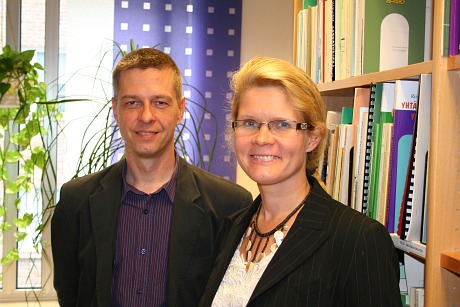 |
Issue 31 (3/2010)
|
|||
FSD Bulletin is the electronic newsletter of the Finnish Social Science Data Archive. The Bulletin provides information and news related to the data archive and social science research.
|
Analysing National Phenomena from a Cross-National PerspectiveThe Church Research Institute, funded by the Evangelical Lutheran Church of Finland, conducts research into religious life, church issues and various trends in contemporary society. The institute makes good use of cross-national comparative surveys in its own research and funds data collection for surveys in Finland. Kati Niemelä and Kimmo Ketola, researchers at the institute, think cross-national surveys are very useful for placing Finnish national phenomena and culture in the international context.
The WVS and EVS, collected roughly every five years, have their origins in catholic countries. Each wave contains data that are interesting to researchers of religion and religiosity, though the data contain attitudinal questions on other issues as well. The ISSP is collected annually but each wave concentrates on one theme at a time. Religion was the main theme in 1991, 1998 and 2008. Finland began collecting data for the ISSP in 2000, so the earlier waves do not contain Finnish data. Cross-national comparisons arouse interestUsing well-know cross-national surveys has other benefits in addition to placing Finnish attitudes and phenomena in context.
The lure of numbersKati Niemelä reveals that she likes numbers and enjoys 'messing about' with fresh data such as the ISSP 2008.
Kimmo Ketola says that particularly comparing Finns and Finland to other countries provides
a lot to analyse, often with somewhat unexpected results. In some issues Finland resembles
catholic countries and in others adheres more to the Nordic patterns.
More variety in cultural coverageKetola says that people doing research on religion and using comparative surveys may encounter two problems. First, there should be a wider coverage of different types of cultures.
Ketola takes as an example Nigeria which in one cross-national survey showed much more positive responses than the average.
In spite of such problems Ketola hopes that more Asian and African countries would participate in cross-national surveys. It would be interesting to see how the main religion(s) of a country affect results.
Scope for further analysisKetola believes that cross-national surveys are not used as much as they could be in
research on religion. Knowledge of statistical methods is not that wide-spread among researchers of religion which in part explains the lack of interest.
|
 Kati Niemelä says cross-national surveys are used in many publications of the institute.
Particularly the World Values Survey (WVS), European Values Study (EVS) and International
Social Survey Programme (ISSP) are used extensively.
Kati Niemelä says cross-national surveys are used in many publications of the institute.
Particularly the World Values Survey (WVS), European Values Study (EVS) and International
Social Survey Programme (ISSP) are used extensively.